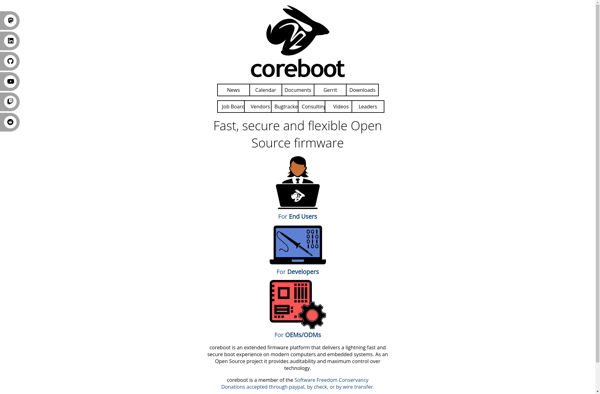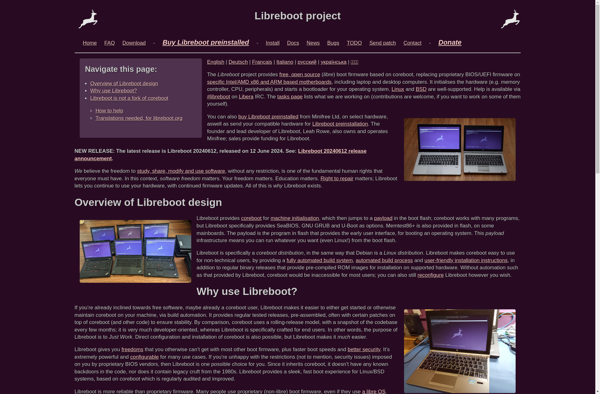Coreboot
coreboot is an open source firmware that replaces proprietary BIOS/UEFI firmware. It aims to initialize hardware and boot a Linux-based operating system quickly and securely.

Coreboot: Open Source Firmware for Secure Linux Boot
An open source firmware replacing proprietary BIOS/UEFI, aiming quick and secure initialization of hardware and booting a Linux-based OS.
What is Coreboot?
coreboot is an open source project that develops Linux-based firmware to replace proprietary BIOS/UEFI firmware on various computer hardware. The goal of coreboot is to initialize and test hardware components of a device and then pass control over to a bootloader that will load an operating system.
Some key points about coreboot:
- It aims to boot Linux-based operating systems faster and more securely than standard BIOS/UEFI firmware.
- Supports many chipsets from AMD, Intel and other vendors used on motherboards and devices.
- Modular architecture allows validation and initialization of hardware components during boot.
- Small codebase focused on hardware init, so boots very quickly compared to UEFI.
- Can give users more control over their hardware, improve security and boot speed.
Overall, coreboot opens up firmware that is normally proprietary. It allows users to audit the firmware code on their machines and verify there are no hardware issues or backdoors before booting into the main operating system.
Coreboot Features
Features
- Open source firmware that replaces proprietary BIOS/UEFI
- Supports initialization of hardware and booting Linux-based OS
- Modular design allowing addition/removal of components
- Support for many chipsets and devices
- Fast boot times
- Security features like verified boot
Pricing
- Open Source
Pros
Open source and free
Better performance than proprietary firmware
More secure and auditable
Greater flexibility and customizability
Faster boot times
Not dependent on any single vendor
Cons
Limited hardware support compared to proprietary firmware
Can be complicated to set up and configure
Requires some technical expertise to use and maintain
Lack of support from hardware vendors
May not support latest proprietary features like Secure Boot
Official Links
Reviews & Ratings
Login to ReviewThe Best Coreboot Alternatives
Top System & Hardware and Firmware and other similar apps like Coreboot
Here are some alternatives to Coreboot:
Suggest an alternative ❐PLoP Boot Manager
PLoP Boot Manager is a lightweight boot loader that enables booting operating systems from CDs, DVDs, or USB drives on legacy computers that lack support for booting from such devices. It works by booting itself first rather than relying on the computer's built-in BIOS boot loader.When started, PLoP presents a...

Chameleon Bootloader
Chameleon Bootloader is an open-source bootloader developed to boot computers into macOS operating system on non-Apple hardware. It was created to enable macOS installation on generic PCs by providing the necessary drivers and extensions.Some key features of Chameleon Bootloader include:Supports a wide range of hardware including graphics cards, network cards,...

Gummiboot
Gummiboot is a boot loader for Linux operating systems using UEFI (Unified Extensible Firmware Interface). It is designed to be a simple, lightweight, and easy-to-use alternative to more complex boot managers like GRUB.Some key features of gummiboot include:Supports booting multiple Linux kernels and operating systems from the same EFI System...

XTIDE Universal BIOS
XTIDE Universal BIOS is an open-source BIOS extension designed to add native Integrated Drive Electronics/Advanced Technology Attachment (IDE/ATA) hard disk drive (HDD) support to personal computers that lack built-in IDE support. It works by providing low-level access to ATA/IDE commands through the computer's BIOS interface.The software was created to allow...

Das U-Boot
Das U-Boot, also known as the Universal Boot Loader, is an open source boot loader used primarily in embedded systems and devices. It is designed to initialize and test hardware components at system start up, as well as load and pass control over to the operating system.Some key features and...

Libreboot
Libreboot is an open source boot firmware (a distribution of coreboot) that replaces proprietary BIOS/UEFI firmware found in most computers. It focuses on providing security, privacy, software freedom and fast boot times.Some key features and goals of Libreboot include:Using fully free and open source software for all firmware code, with...

SeaBios
SeaBIOS is an open source implementation of a 16-bit x86 BIOS (Basic Input/Output System). It provides the core firmware code required to initialize the hardware and boot an operating system when a computer is powered on.Unlike proprietary commercial BIOS solutions, SeaBIOS is designed to be small, lightweight, portable and compatible...

Petitboot
Petitboot is an open-source network bootloader and discovery tool designed for PowerPC systems. It enables netbooting over common network protocols like HTTP, FTP and TFTP to load operating systems or other payloads.Some key features of petitboot include:Netbooting support for PowerPC - petitboot handles retrieving kernels, initrds and device trees over...
